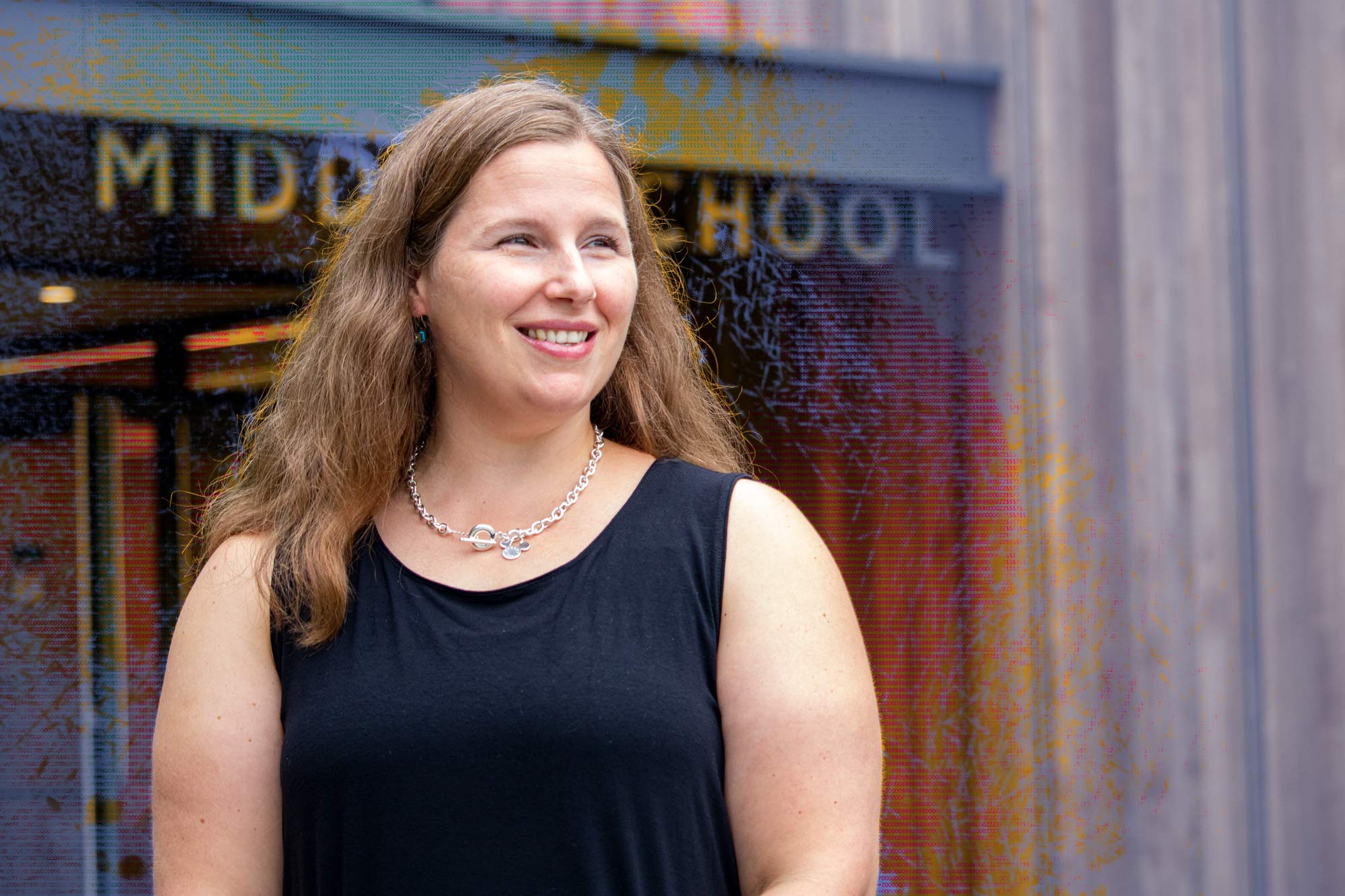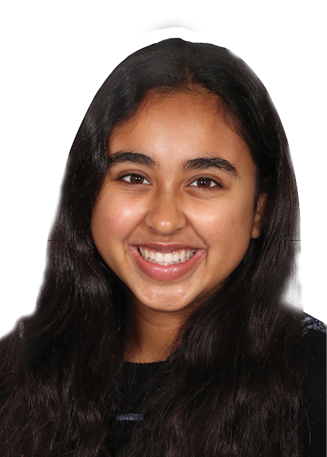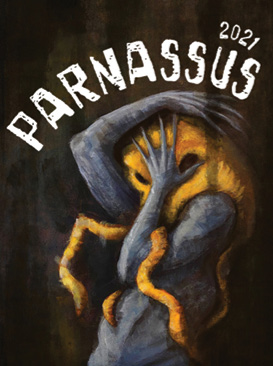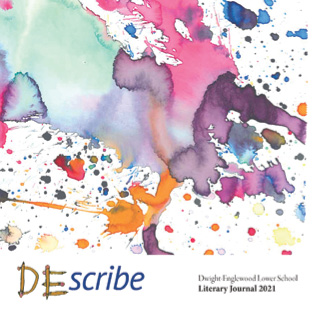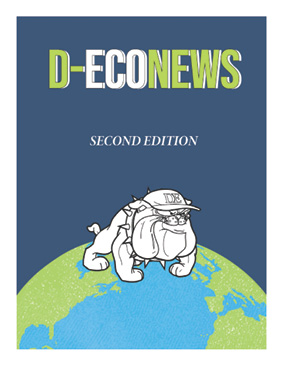![]() What has been your primary focus as English Department Chair, and what does the department hope students will gain from their learning experiences?
What has been your primary focus as English Department Chair, and what does the department hope students will gain from their learning experiences?
![]() I sort of have my own mission statement for the English Department. I believe that our goal should be to help students build empathy through an understanding that when you read and you write, those are acts of connection.
I sort of have my own mission statement for the English Department. I believe that our goal should be to help students build empathy through an understanding that when you read and you write, those are acts of connection.
At the core, we want students to be able to “read” the world around them, no matter what the text is. We want them to be able to know how to think. Knowledge is important, but in our department, it’s not all about content. We teach these cool electives, but at the end of the day, whatever text we’re teaching, we’re teaching skills. So I think if we can develop empathetic readers who are able to put themselves into another person’s experience that is either like or unlike their own and be able to come out of it, question it, talk about it, and write about it in a way that increases their own self-knowledge, I think we will have done a good job.
![]() How did COVID and hybrid and/or remote learning affect your department’s ability to deliver on skills and content?
How did COVID and hybrid and/or remote learning affect your department’s ability to deliver on skills and content?
![]() I think a lot of the department members found different ways to assess the year. We’re a skills-based department, so we can still teach reading and writing, no matter what’s going on. But I think there was a lot more flexibility in terms of being able to provide feedback to students because there wasn’t the time pressure, [the pace was slower and] even the deadlines were very fluid and flexible. I think teachers felt like they were really able to engage with students’ writing processes one-on-one, like going through several iterations and teaching kids about revision. If there’s creativity in slowing down, I think we took that slowing down to heart.
I think a lot of the department members found different ways to assess the year. We’re a skills-based department, so we can still teach reading and writing, no matter what’s going on. But I think there was a lot more flexibility in terms of being able to provide feedback to students because there wasn’t the time pressure, [the pace was slower and] even the deadlines were very fluid and flexible. I think teachers felt like they were really able to engage with students’ writing processes one-on-one, like going through several iterations and teaching kids about revision. If there’s creativity in slowing down, I think we took that slowing down to heart.
[In our digital world] there’s this emphasis on reading for information and the scroll-constant-scroll [mentality], and that’s what we’re in many ways, fighting against. We say, “Hey, slow down, let’s critically digest, ask questions, make inferences about the aesthetics, the form, the structure, and so on.”
I think those are the skills that we’re trying to teach in terms of reading. Writers benefit from learning a standard formula, which we teach, but we really do try, once they’ve got it, to open them up to different essay forms and learn to be independent and creative in their expression by reading widely and then trying to imitate it themselves.
![]() Were you proud of how your students responded to the difficulties presented by the pandemic?
Were you proud of how your students responded to the difficulties presented by the pandemic?
![]() I think my greatest feelings of pride this past year were when the kids really showed their resiliency and their hope.
I think my greatest feelings of pride this past year were when the kids really showed their resiliency and their hope.
I was teaching Apocalyptic Literature last year, and due to COVID, it was hybrid. It was all about contemplating these horrific scenarios that [related to what] we were living in real life. We ended by reading Margaret Atwood’s Oryx and Crake. It‘s about a young man who is living in a world on the precipice of apocalypse. The final project was to develop an independent school that could have existed when this kid was an adolescent. Students had to create foundation documents for this school like the mission statement, the profile of a graduate, and what would a student graduating from this school do. It had to address the novel’s problems, so here’s how we’re going to solve it through a mission-driven institution. I had a student who created a school for empathy. It was so idealistic and hopeful. I thought, “If this can be happening with everything that is going on, we’re going to be okay.”
![]() Write Night, a traditional English department-hosted gathering, was on Zoom last year. How did that go?
Write Night, a traditional English department-hosted gathering, was on Zoom last year. How did that go?
![]() When our Write Night Spring 2021 (see next page) event was scheduled, I didn’t know how this was going to work on Zoom. Then it happened, and I thought, “This is so awesome!” It was so lovely and so therapeutic to hear people read poetry. No, we weren’t together in-person in the library, but it was still a lovely way to spend an hour and a half. Even in a pandemic, we’re going to keep doing this because it is important.
When our Write Night Spring 2021 (see next page) event was scheduled, I didn’t know how this was going to work on Zoom. Then it happened, and I thought, “This is so awesome!” It was so lovely and so therapeutic to hear people read poetry. No, we weren’t together in-person in the library, but it was still a lovely way to spend an hour and a half. Even in a pandemic, we’re going to keep doing this because it is important.
![]() How do you ensure that the creative and fictional kinds of writing taught in English classes feel relevant to students and applicable to the real world?
How do you ensure that the creative and fictional kinds of writing taught in English classes feel relevant to students and applicable to the real world?
![]() I know we tend to separate analytical writing from creative writing, but in truth, all writing is both analytical and creative. Much of the personal narrative writing students do in the years leading up to their tenth grade writing portfolio helps them learn more about themselves and the different facets of their identities. That kind of exploration is always valuable. We also teach creative writing in the Upper School. I recently watched Dr. Abbey Morgan teach her students about seven different types of conflict that can exist in a story, but she entered that lesson by asking students to write about an internal or external conflict in their own lives. Learning to write a story is going to help you understand what it means to be human just as much (maybe more!) as reading one will.
I know we tend to separate analytical writing from creative writing, but in truth, all writing is both analytical and creative. Much of the personal narrative writing students do in the years leading up to their tenth grade writing portfolio helps them learn more about themselves and the different facets of their identities. That kind of exploration is always valuable. We also teach creative writing in the Upper School. I recently watched Dr. Abbey Morgan teach her students about seven different types of conflict that can exist in a story, but she entered that lesson by asking students to write about an internal or external conflict in their own lives. Learning to write a story is going to help you understand what it means to be human just as much (maybe more!) as reading one will.
![]() How has the English Department changed over the years you’ve been at D-E?
How has the English Department changed over the years you’ve been at D-E?
![]() I thought the English Department was really strong when I got here [in 2006], but I think we’ve done a lot of work.
I thought the English Department was really strong when I got here [in 2006], but I think we’ve done a lot of work.
We’ve [made an effort to] increase the diversity and plurality of voice and experience in the curriculum. Like when [the protest and aftermath of] Charlottesville, VA, happened. I think [former English Department Chair] Fred Daly motivated the department to take that as an opportunity for us to overhaul and re-think all our curriculum. Students need to be able to see themselves and their own experiences in the curriculum and see others not like themselves.
The Middle School has been a leader in this by adding more choice to the curriculum. When you have a student choice unit, you can offer multiple text options. If a student wants to connect with an experience that they feel like they might identify with in some way, they can write about it. Conversely, they may be thinking, “I have seen myself in many of these stories already, so I’m going to go for something that seems very different from me.”
I think adding choice units in the tenth grade [along with the Middle School grades] is a way to increase those kinds of options. It also encourages us, as a faculty, to read because we’re always looking for new books to either teach or allow students to read.
We also overhauled the ninth and tenth grade curriculums. We have really grown the global elective requirements. I think it’s like a badge of honor that a lot of teachers can say, “I’ve developed three new electives, and they can just go on rotation.” I think the department has very much tried to move itself forward in those areas and make sure that there are windows and mirrors in the curriculum.
I can’t take the credit. Fred [Daly] led the charge in the overhaul. It began with the ninth grade faculty [evaluating] their texts around coming of age stories. They made a really concerted effort to draw globally. For example they used to use, First Sightings, which was a short story collection that they’ve been reading for a long time. Then they decided to choose an anthology that is called Coming of Age Around the World. So the emphasis is already drawing from very different experiences.
The tenth grade did a similar thing. The tenth grade explores “what does it mean to be an American?” Then we tried to rephrase it a little bit to say “what are the American narratives and who writes them?” We aimed to open up that idea for a long time. There can be a very mainstream, white, cisgendered American experience, so that is where these texts are coming from. We need to make that more complex.
I think one of the takeaways we wanted students to get is that there are people that didn’t get to write their American narrative. They’re just writing them now and many of them are, in a way, a response to everything that came before.
I just like it because it’s dynamic. I appreciate this idea of a proactive rather than static curriculum.
![]() How does each grade’s curriculum build off of each other into a cohesive pedagogical philosophy?
How does each grade’s curriculum build off of each other into a cohesive pedagogical philosophy?
![]() This is one of the things where I think that we’ve done so much work, and we still have work to do. Vertical integration of our curriculum, for example from the Lower into Middle Schools, can continue to be strengthened and expanded upon. While I am chair of Grades 6 through 12, there is an emphasis on needing to make sure that our curriculum has a K through 12 scope and sequence. We’ve applied overhauls to our offerings in the ninth grade and the tenth grade. Now that we’ve made all these big changes that are unique to each grade level, we need to zoom out and look at the whole scope. So that will be part of our departmental work in the next few years.
This is one of the things where I think that we’ve done so much work, and we still have work to do. Vertical integration of our curriculum, for example from the Lower into Middle Schools, can continue to be strengthened and expanded upon. While I am chair of Grades 6 through 12, there is an emphasis on needing to make sure that our curriculum has a K through 12 scope and sequence. We’ve applied overhauls to our offerings in the ninth grade and the tenth grade. Now that we’ve made all these big changes that are unique to each grade level, we need to zoom out and look at the whole scope. So that will be part of our departmental work in the next few years.
As a starting point example, we met together with teachers from fifth through twelfth grades. [Lower School learning specialist] Ashley Gray was one of our facilitators during this collaborative meeting. The Lower School has done a lot with the [Columbia University] Teachers College Reading and Writing Project, and they worked with a consultant. It was great to hear what they were doing so that we could figure out how we can build on that in sixth, seventh, and eighth grades.
As another example, sixth grade teacher Sarah Macone teaches students how to write an essay––that is the focus: even though you’re only in sixth grade, you’re going to be analytical writer. It’s great because the students feel very independent and scholarly. Seventh graders do a lot of creative assignments. For example, after the Biden inauguration, the students did an Amanda Gorman “The Hill We Climb” response poem. There’s a little bit more expressive exploration in seventh grade. And then in eighth grade, the goal has been to help them develop into student leaders, with the opportunity to showcase their views with the MAD [Making a Difference] project. The Middle School sequence from eighth to ninth grade can be challenging. We’re having those transition conversations, which I think is good. We’ve done a lot of work already, and again, I think we can continue to zoom out a little bit and look at the whole scope and sequence.
![]() What do you see the department continuing or expanding upon?
What do you see the department continuing or expanding upon?
![]() We [hosted presentations by] all these poets in last year, and I credit [former Director of Inclusion & Equity Engagement] Dr. Mirangela Buggs for a lot of that. She brought in Poet Laureate Richard Blanco*, which was amazing.
We [hosted presentations by] all these poets in last year, and I credit [former Director of Inclusion & Equity Engagement] Dr. Mirangela Buggs for a lot of that. She brought in Poet Laureate Richard Blanco*, which was amazing.
It made sense to be reading poetry, focusing on poetry, hearing people talk about poetry. It was like a balm for what was going on. And so, I would love to talk to the department and to students about the ways in which language, poetry, and written expression can be therapeutic because I think a lot of people are also going to need to heal next year and rebuild. I would like to continue using poetry and writing and reading as a way to continue that process.

